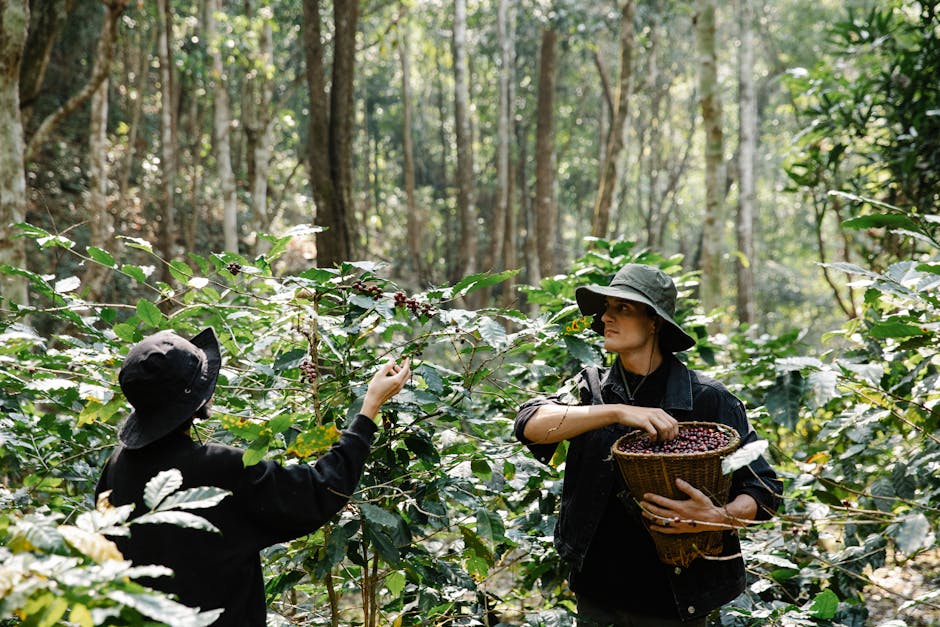
The Definitive Guide to Understanding Sustainable Coffee Farming Practices
What is sustainable coffee farming?
Sustainable coffee farming focuses on methods that protect the environment, promote fair treatment of workers, and support local communities. Some key practices include using organic fertilizers, conserving water, and reducing waste. Shade-grown coffee is a common method that maintains biodiversity and protects the ecosystem. Fair trade practices ensure that farmers receive a fair price for their coffee, leading to better living conditions and economic stability.
Benefits of sustainable coffee practices
Sustainable coffee practices benefit not just the environment but also the farmers and the quality of the coffee itself. By using sustainable farming methods, farmers can protect the land and water, reduce the need for harmful chemicals, and preserve biodiversity. These practices also promote fair treatment and payment for coffee growers, creating a more ethical and equitable coffee industry. Additionally, coffee produced through sustainable methods often has better taste and quality due to the care taken throughout the cultivation process.
Environmental impact of sustainable coffee farming
Sustainable coffee farming helps reduce harm to the environment by promoting practices like shade-grown cultivation and organic farming. These methods protect biodiversity, minimize the use of chemicals, and promote healthier soil. By supporting sustainable coffee farming, you contribute to preserving the ecosystem and biodiversity in coffee-growing regions.
Economic aspects of sustainable coffee farming
Coffee farmers who prioritize sustainability can actually benefit economically in the long run. By implementing environmentally friendly practices, these farmers can improve soil fertility, reduce the need for expensive pesticides, and enhance the quality of their coffee beans. Additionally, sustainable coffee farming often opens up new markets for these farmers, as more consumers are willing to pay a premium for ethically sourced coffee. Fair trade and organic certifications can also lead to higher prices for the coffee produced, increasing the overall profitability of sustainable farming.
Social benefits of sustainable coffee farming
Sustainable coffee farming not only helps the environment but also benefits communities. Some social advantages of sustainable coffee farming include:
- Fair Wages: Farmers are often paid fair prices for their coffee beans, ensuring they can support their families.
- Community Development: Sustainable practices can lead to the development of schools, healthcare facilities, and infrastructure in coffee-growing areas.
- Empowerment: By promoting sustainable farming, communities can become more self-sufficient and have a say in their economic futures.
These social benefits make sustainable coffee farming a crucial aspect of creating a better future for both farmers and their communities.
Sustainable farming techniques used in coffee cultivation
Sustainable farming techniques in coffee cultivation aim to protect the environment and support local communities. Farmers practice methods like shade-grown cultivation and composting to maintain soil health and biodiversity. Additionally, they use water-efficient irrigation systems to conserve water resources. By promoting sustainable coffee farming, farmers can reduce their environmental impact and ensure the long-term viability of their coffee plantations.
Certification systems and labels in sustainable coffee farming
Certification systems and labels exist to provide assurance that coffee is produced sustainably. They help consumers choose coffee that aligns with their values and supports ethical practices. Some commonly recognized certifications include Fair Trade and Rainforest Alliance. These labels signify that the coffee was sourced in a way that benefits the environment and the people involved in its production. By looking for these labels when purchasing coffee, you can contribute to a more sustainable and ethical coffee industry.
Challenges faced in sustainable coffee farming
Sustainable coffee farming faces several challenges that impact the industry. Climate change is a significant issue, affecting coffee plants’ growth and leading to crop diseases. Limited access to resources like water and land also hinders sustainable farming practices. Market volatility can disrupt farmers’ incomes, making it challenging to invest in sustainable methods. Resolving these challenges is crucial for the long-term viability of sustainable coffee farming.
Future trends and innovations in sustainable coffee farming
In the future, sustainable coffee farming is expected to see an increase in technological advancements that will help boost productivity while minimizing environmental impact. Some key innovations to watch out for include smart irrigation systems that optimize water usage, precision agriculture techniques that improve crop yield and quality, and renewable energy sources to power farm operations sustainably. Additionally, there is a growing trend towards regenerative farming practices that focus on restoring soil health and biodiversity to create more resilient coffee farms. These future trends and innovations in sustainable coffee farming aim to ensure a more environmentally friendly and socially responsible coffee production process for a more sustainable future.
Conclusion: Importance of supporting sustainable coffee farming
Supporting sustainable coffee farming practices is crucial for ensuring the future of the coffee industry and the well-being of our planet. By choosing to support sustainable coffee farming, you are directly contributing to the protection of the environment, the conservation of natural resources, and the improvement of the livelihoods of coffee farmers. It also leads to the production of high-quality coffee beans that are grown ethically and without harming the ecosystem. Next time you enjoy your cup of coffee, remember the impact of choosing sustainably sourced beans and the positive change it brings to the world of coffee farming.

